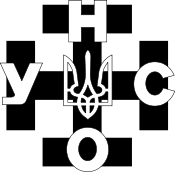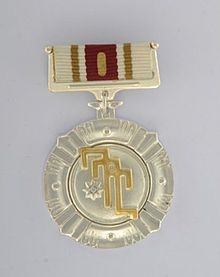- Ukrainian National Assembly
-
Ukrainian National Assembly – Ukrainian National Self Defence
Українська Національна Асамблея – Українська Народна Самооборона
Leader Yuriy Shukhevych[1][2] Founded 3/4 November 1990 Headquarters Kiev Ideology Ukrainian nationalism Political position Right-wing International affiliation None Official colours Red, black Website http://www.una-unso.in.ua Politics of Ukraine
Political parties
ElectionsThe UNA-UNSO (Ukrainian National Assembly – Ukrainian National Self Defence) (Ukrainian: УНА УНСО, Українська Національна Асамблея – Українська Народна Самооборона), is the most prominent (with 8,000 members[3]) nationalist political organization in Ukraine[4].
Contents
History
Ukrainian National Assembly (UNA) was created on June 30, 1990 in Lviv under the name of Ukrainian Inter-party Assembly (UMA). It was led by a maverick politician and nationalist writer Dmytro Korchynskyy. On August 19, 1991 in the fight against the State Committee of Extraordinary Situations (GKChP) UMA creates UNSD, a Ukrainian self-defense organization, around a small group of ethnically Ukrainian Soviet army veterans who fought in Afghanistan. On September 8, 1991 UMA was officially renamed as the Ukrainian National Assembly, while among people became known as UNA-UNSO due to the UNSO close association with UNA.
Between 1993 and 1994 Ukrainian National Assembly organized groups throughout Ukraine, even in traditionally less nationalist Russian-speaking Donbas region. Ukrainian government started to fear the spread of extreme ideology of UNA-UNSO. Party headquarters as well as homes of most prominent activists were routinely raided by the police. At the same time UNA-UNSO was involved in shady dealings with Ukrainian organized crime. Several high-ranking UNA-UNSO members were victims of organized crime related murders.[citation needed]
Despite this during Ukrainian parliamentary election in 1994 three UNA-UNSO members were elected as deputies of Verkhovna Rada (Ukrainian parliament).
 UNA-UNSO members parade through the streets of Lviv
UNA-UNSO members parade through the streets of Lviv
Between 1994 and 1997 UNA-UNSO members gained prominence in Ukraine through a number of anti-Russian actions. UNA-UNSO deputies destroyed a Russian flag in Ukrainian parliament, UNA-UNSO fighters joined the Chechen rebels in First Chechen War and fought against the Russian army, its activists organized street protests against Russian pop-stars visiting Ukraine. UNA-UNSO took sides in Ukrainian church affairs and in July 1995 clashed with police during the funeral of Patriarch Volodomyr (Romaniuk), head of Ukrainian Orthodox Church - Kiev Patriarchate. UNA-UNSO supported Patriarch Filaret (Mykhailo Denysenko) excommunicated by the Russian Orthodox Church, and participated in violent attempts to capture church property for the new church, notably in Rivne and Volyn oblasts. Membership of the organization peaked at around 10 000 members, who were mostly young Ukrainians. About 90 % of its members were between 18 and 35 years old. Ideology of the organization combine radical Ukrainian nationalism, anti-Semitism,[citation needed] support for an authoritarian form of government and "national-oriented" economy.[citation needed]
In 1997 government of Leonid Kuchma banned the Ukrainian National Assembly — Ukrainian National Self Defence. Members of UNA-UNSO responded with a number of violent street protests, resulted in over 250 arrests. Dmytro Korchynskyy himself was arrested and soon after left the ranks of UNA-UNSO.
In 1998 UNA-UNSO re-appeared as a more moderate strictly nationalist rather than a neo-Nazi organization[citation needed]. New leaders of the organizations became Andriy Shkil and Yuriy Shukhevych, son of prominent Ukrainian nationalist Roman Shukhevych.
UNA-UNSO participated in Ukrainian parliamentary election of 1998 but managed to get only 0.39 % of the votes.[5]
In 2000 and 2001 members of Ukrainian National Assembly — Ukrainian Nationalistic Self Defense actively participated in Ukraine without Kuchma mass protest campaign.
During the 2002 parliamentary elections Andriy Shkil won a single-mandate constituency in the Lviv Oblast (province) and thus a seat in the Verkhovna Rada[6][7], the party itself won 0,04% of the votes[5]. In 2003 Shkil left the party[8], he has become a close aide to influential politician Yuliya Tymoshenko[9][10].
During Orange Revolution UNA-UNSO members supported Viktor Yushchenko against his pro-Russian opponents. UNA-UNSO members provided security for the supporters of Viktor Yushchenko, and prominent leaders of the Orange camp such as Yulia Tymoshenko on Independence Square in Kiev[11].
In 2005 Yuriy Shukhevych became the leader of the party again. In the 2006 parliamentary elections the party failed to win parliamentary representation with 0,06% of the votes.[5] The party did not participate in the 2007 elections.[5]
In 2008 the South Ossetian Prosecutor General Teimuraz Khugayev accused UNA-UNSO to have participated with a unit on the Georgian side during the August war. But so far no evidence of this has been provided.[12] According to a Russian Investigative Committee report of August 2009 200 members of the Ukrainian UNA-UNSO and full-time servicemen of the Ukrainian army aided Georgian forces during the fighting, Ukraine denied the accusation. UNA-UNSO deputy head Nikolay Karpyuk said that “unfortunately” no members of the organization took part in the fighting in Georgia[13].
International Conflicts
In a War of Transnistria members of UNA-UNSO fought on the side of Transnistrian separatists against Moldovan forces.[14] This was justified as a defense of large ethnic Ukrainian minority in Transnistria. Over 50 members of UNSO were awarded order "Defender of Transnistria".
In spring of 1992 700 members of UNSO participated in extinguishing a pro-Russian separatist movement in Crimea. In autumn of 1992 a similar movement was extinguished in Zakarpattia. Concurrently with that UNSO sponsored a return of the Ukrainian veterans from across the Soviet Union.
In 1993 UNA-UNSO sent volunteers to participate in Georgian-Abkhaz conflict in fight against the Abkhasian separatists. UNA-UNSO fighters formed a unit called "Argo" and joined Georgian side against Russian-backed Abkhaz forces. Seven members of UNSO perished during the conflict near Sukhumi, 30 members were awarded the order of "Vakhtang Gorgasali".
Ideology and image
The party maintains a close relationship with the National Democratic Party of Germany which is considered to be a promoter of a neo-Nazi ideology by some. UNA-UNSO has been widely considered to have employed neo-Fascist and neo-Nazi methods and ideologies[4][16][17].
International security expert Andrew Mcgregor has stated (in 2006) that the UNA-UNSO "might be best characterized as an influential fringe movement", and that "its high visibility belies its limited numbers".[3]
UNA-UNSO has an anthem, which is called 'Stay, my love, don't cry, honey'. It is a remake of the Bella Ciao song.[18]
See also
References
- ^ Shukhevych re-elected as UNA-UNSO leader, Kyiv Post (June 30, 2010)
- ^ UNA-UNSO Official party web page
- ^ a b Radical Ukrainian Nationalism and the War in Chechnya, The Jamestown Foundation, March 30, 2006.
- ^ a b Global Research, Neo-Nazi Organizations in the Ukraine, December 17, 2004
- ^ a b c d (Ukrainian) Українська національна Ассамблея, Database DATA
- ^ The Constituency № 121, Central Election Commission of Ukraine (2002 regular election)
- ^ Results of voting in single-mandate constituencies, Central Election Commission of Ukraine (2002 regular election)
- ^ UNA-UNSO :: Articles
- ^ Yulia Tymoshenko’s orbits / Ukrayinska Pravda
- ^ The Makeup of the New Verkhovna Rada / Ukrayinska Pravda
- ^ Far-right Group Flexes During Ukraine "Revolution", The Associated Press, January 1, 2005]
- ^ Allenova, Olga (2008-11-25). "Foreign Traces in the Strange War". Kommersant. http://www.kommersant.com/p1080698/r_530/Russia_claims_Georgia_hired_mercenaries/. Retrieved 2008-11-30.
- ^ Ukrainian army supported Georgian attack on South Ossetia, Russia Today (August 24, 2009)
- ^ About UNA-UNSO
- ^ Una-Unso old party website
- ^ Adam Zwass, From Failed Communism to Underdeveloped Capitalism, M.E. Sharpe:2001, p117.
- ^ Walter Laqueur, Fascism: Past, Present, Future, Oxford University Press, 2001.
- ^ (Ukrainian) УНСО, YouTube
External links
- UNA-UNSO Official party web page
- The rise and fall of a radical movement - Kyiv Post (November 8, 2001)
Categories:- Nationalist parties
- Political parties established in 1990
- Political parties in the Soviet Union
- Political parties in Ukraine
- Politics of Ukraine
- Ukrainian nationalism
Wikimedia Foundation. 2010.


